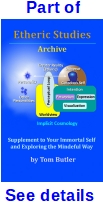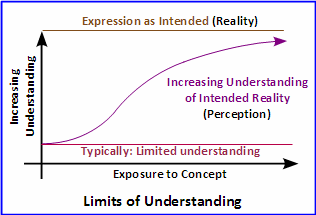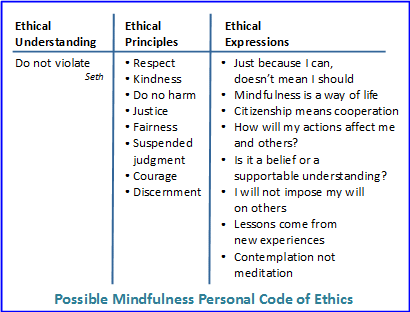 This essay introduces a new blog. The objective is to highlight important topics to help paranormalists gain understanding about psychic and survival-related experiences. Emphasis will be on possible best practices, useful theories and techniques. Aspects of the community which tend to hinder progress will also be addressed. The tone will be a call to action in the form of encouraging people to accept the personal responsibility to self-educate and participate to help others do the same.
This essay introduces a new blog. The objective is to highlight important topics to help paranormalists gain understanding about psychic and survival-related experiences. Emphasis will be on possible best practices, useful theories and techniques. Aspects of the community which tend to hinder progress will also be addressed. The tone will be a call to action in the form of encouraging people to accept the personal responsibility to self-educate and participate to help others do the same.
As It Is
It is common to hear paranormalists complain that there has been no real progress in understanding paranormal phenomena. Having studied many of the phenomena for a good part of my life, I have to agree. As a community, paranormalists are actually becoming less well-informed.
To explain, let me first make sure we agree about the terms I am using:
Community: A community can be defined as individuals sharing common interests.
Paranormalist: I defined paranormalist for Your Immortal Self as people who are more than a little interested in paranormal phenomena, or who are studying or practicing some technique related to the paranormal. Examples of paranormalist interests include the study of psi phenomena (telepathy, remote viewing, telekinesis), healing intention (biofield healing, distant healing, healing prayer), hauntings investigation, transcommunication (mediumship, ITC, channeling) and survival (the etheric, personality, cosmology).
Paranormalist Community: The paranormalist community consists of people in some way interested in paranormal phenomena.
As a long-time observer of our community, I have witnessed early efforts to understand these phenomena become overshadowed in recent years by well-meaning but poorly prepared paranormal enthusiasts seeking silver bullet-like techniques for spirit communication. Today, popular theories are mostly based on religious dogma and simplistic versions of misunderstood ancient wisdom. Even more discouraging is the increasingly popular quantum mysticism that has little more than sounds right proof.
Meanwhile, people offended by the idea of survived personality are able to further marginalize our community by claiming many of our concepts are demonstrably nonsense. In Skepticism: The New Religion, Roy Stemman illustrated the decline of our community as the skeptic community has flourished. (His focus is on Spiritualism, but remember that Spiritualism is a subset of the paranormalist community.)
By establishing the study of paranormal phenomena as pseudoscience, and then convincing the government that belief in pseudoscience is a danger to society, skeptics are in the process of marginalizing the study to “For entertainment only” status, if it survives at all.
While it is important that each of us is free to find our own way, there are consequences of too much self-centered seeking. The solution, I think, is for us to work together to develop and agree on useful models. The second part of that is to encourage thoughtful individuals to understand and then agree on how to explain the consensus models to the rest of us. Finally, paranormalists must support those teachers while continuing to insist on a pragmatic approach to all things paranormal that is based on solid research and not on sounds right theory.
That may seem like a utopian objective, but in a practical sense, developing a cooperative community represents a fork in the road that leads to our being more at peace with ourselves and the idea of death. The alternative is a continued slide into mediocracy.
My description of a consensus model and standardized approach to teaching may sound utopian, but it is exactly what we have in mainstream science and the education system. While the establishment approach has problems, it at least supports forward progress.
Paranormalist Musing
I selected Paranormalist Musing for the name of this blog because I intend to write about a wide range of paranormalist subjects in a relatively casual format. The essays will be my opinion. My hope is that you will use what I write, not as truth, but as food for thought. You are part of the paranormalist and it is up to the collective you to decide how it will evolve.
Conceptual Space
A good way to think of who we are, our purpose, our spiritual nature and the nature of reality, is to be mindful of the difference between objective physical space and conceptual etheric space. In the models I have studied that make sense, the etheric is the actual reality and this physical is a creation of the collective you. The physical is a construct collectively imagined as an aspect of the greater reality. We assign objectivity to information associated with the physical construct. The purpose of the physical is thought to be to facilitate experiences which might further our understanding of the greater reality.
Getting this straight can be challenging, so take some time to read a few of the Concepts essays such as Etheric Fields, Perceptual Agreement and Immortal Self-Centric Perspective. Just remember that your conscious self (I think I am this) and your immortal personality (I am this) are separated by your mostly unconscious mind. Your I am this aspect is in conceptual space. Your mostly unconscious mind is conditioned to assign physicality to the experiences your I think I am this aspect has via your human avatar.
I try to make this distinction in my writing by saying that we as conscious self have a body-centric perspective of reality during a physical lifetime. Even when in dream or physical death, we have a mostly body-centric (more familiar) perspective. In seeking spiritual maturity, our objective is to evolve our awareness to have a more etheric personality perspective. I describe that as being more lucid.
Another way the difference between conceptual space (etheric) and objective space (physical) can be noted is that the creative process has more effect in the etheric. I define the Creative Process as attention on an imagined outcome to produce an intended order. In the physical, it appears effectiveness of the creative process is moderated by intended order expressed by others so that we end up with a collective result. That is another important reason for working in a cooperative community.
Consequences of Belief
Selection of words is an important part of the message. While that sounds obvious, it seems my writing is sometimes difficult to follow. I think this is because, while I try to always use common words, I often intend their third or fourth definition. Lucidity is an example, as is the hyper- prefix in hyperlucidity. To compensate, I try to make sure the context clarifies the meaning. That is usually why I am so wordy.
The following words are especially important in my writing.
Actual
The first three Wordweb definition for actual are as I intend it here: 1. Presently existing in fact and not merely potential or possible; 2. Taking place in reality; not pretended or imitated; and, 3. Being or reflecting the essential or genuine character of something.
I refer to the life field of a hypothetical Source or First Cause as the reality field. The expression of this life field as Natural Law or Organizing Principles that I refer to as actual reality. It is this actual reality we seek to understand.
Understanding
I define the Understanding Organizing Principle for the Implicit Cosmology as “perception of reality as it is and not as it is believed to be.” Experience becomes understanding as personality aligns personal reality with actual reality as it is perceived via conscious self. A fundamental concept in the Implicit Cosmology is that personality exists to experience, gain understanding from that experience and return that understanding to the Collective. Understanding is seen as being a quality of personality, and is, therefore, the quality determining perceptual agreement. Understanding is a measure of progression.
As a fine point, there are three primary aspects of reality. Actual reality is as it is expressed by Source and is based on Source’s current understanding of its nature. Local reality is the way actual reality is differentiated into this venue for learning. Personal reality is the aspect of local reality of which an individual is aware. For instance, I am aware of small villages in India, but my sense of reality does not include how it might be to live in such a small village. The actual nature of the small village is not part of my personal reality.
Understanding someone else’s personal reality is useful to facilitate cooperation. The objective of gaining spiritual maturity is learning to understand the conceptual principles governing the operation of reality which are the same for every version.
Spiritual Maturity
 Many systems of belief describe the reason for our existence is to gain understanding through life experiences. This is often referred to as seeking spiritual maturity, seeking enlightenment, progression or self-realization. For instance, the 22 Keys of the Tarot’s Major Arcana represent the progression from a naive seeker just stepping onto the way to the spiritually mature seeker continuing the never-ending journey.
Many systems of belief describe the reason for our existence is to gain understanding through life experiences. This is often referred to as seeking spiritual maturity, seeking enlightenment, progression or self-realization. For instance, the 22 Keys of the Tarot’s Major Arcana represent the progression from a naive seeker just stepping onto the way to the spiritually mature seeker continuing the never-ending journey.
Progression toward spiritual majority is a process that is measured in degrees of lucidity. The idea is that we gain understanding which is contributed to the collective. In turn, whatever overriding consciousness you think of as Source, Infinite Intelligence or God, comes to better understand its own nature from the collective understanding.
For any life field, with increased understanding comes change in expression. For instance, we modify our behavior as we become more aware of its effect on our world. In a similar way, it is modeled in the Implicit Cosmology that the expression of Source is modified as It gains more understanding. Thus, we are always seeking to understand an evolving set of Organizing Principles.
Lucidity
And last, I define lucidity as “the degree to which we are able to clearly sense information from our mostly unconscious mind.” According to the Gale Encyclopedia of Occultism & Parapsychology, lucidity is a term that was used in the early 1800s to describe the human abilities to sense subtle energy. This form of sensing has been more recently known as clairvoyance, psychometry and premonitions; however, these terms have been replaced by Extra Sensory Perception or ESP, which itself is now being replaced by psi functioning.
Because our natural habitat is conceptual space (etheric), physical energy has no meaning. The equivalent in conceptual space is the influence of intention. Rather than saying energy, I have been learning to say influence or intention. It is not spiritual energy, It is the influence of intention. Psychics do not sense energy. They sense visualized expression in the form of a life field’s influence on as intended order.
The Secret Wisdom
Through the ages, the Key to Spiritual Maturity has been this:
Increased understanding of the actual nature of reality by way of experience, manifests as increased lucidity and greater opportunity for new experiences.
You can read this in the context of your personal beliefs or religious upbringing. For instance, a religious person might hear this as “Understanding the nature of His creations brings you closer to God”
Focus on the concepts. Lucidity is a function of how well you are able to experience the greater reality, and lucidity is based on aligning worldview with the actual nature of your local reality through gaining understanding. While there are many ways to seek greater lucidity, the one way I have found most useful for me has been the habitual practice of treading the Mindful Way.
Much of my writing in this blog will be couched in the terms used in the Implicit Cosmology. I write in this way so as to help you begin to get the hang of thinking as a spiritual being rather than a human animal.
It is very important to understand that the Mindful Way represents a way of experiencing life. It has nothing to do with what you do for a living. The Mindful Way may be followed in this lifetime while living as a king, a genitor, a prisoner, a happy family member or a drug addicted person. It is not the experience. It is what we learn from the experience. It is “Holy is the person who seeks to understand,” not, “Holy is the person who has a high station in this lifetime.”
Virtual Teacher
Lines 1-III-14 and -15 of the ancient text known as the Katha Upanishad advises that seekers should find a teacher and consciously step onto the path toward greater understanding. It advises that, like a razor’s edge, the path is a narrow way in that it is far from the excesses seen on either extreme. It is also a difficult way because it is so easy for the seeker to turn toward misconception and illusion.
The Katha Upanishad was written some 4,000 years ago. Prior to that, only oral tradition was available to pass down important wisdom. Today, our teacher is the Internet. It offers easy access to countless books and articles conveying understanding acquired by those who have gone before. The task is to find a way to distinguish between true wisdom and baseless beliefs. Without the guidance of wiser heads in the community, your chances of finding useful wisdom is slight. So, while you have a ready teacher in the Internet, you still need to be able to distinguish wisdom from irrational mysticism.
While we are fortunate these days to have a virtual teacher, it is the community of like-minded paranormalists that helps make this possible. My main point of this and future issues of this blog is that the quality of your virtual teacher is improved as the community becomes more coherent. Conversely, it is diminished by a more discordant community.
I will write about issues I think moves us toward an informed community and those that turn us toward mediocracy. As you read my writing, please remember that I am not your teacher, only a reporter. Like a good reporter, I try to explain while informing. It is for you to translate what I write into a form most useful for your purpose.
Thoughts for Contemplation
These are a few concepts I have found useful for my personal seeking. Read and then contemplate each until it makes sense. Ask questions, perhaps with a comment on this page or in the ATransC Idea Exchange. We can both benefit from your questions.
Many of these phrases came to mind during the over three years required to write Your Immortal Self and were included in the last chapter of that book. Some are silly, all serve as shorthand for a much more complex thoughtform.
Cycles of Progression: Having learned, it is our lot to teach.
The three phases of a student: study, comprehend and apply.
The three phases of a teacher: study, comprehend and teach.
The Golden Rule Redo: Teach me as I teach you.
The Way of Progression: Through community comes knowledge; through teaching comes understanding; it takes a collective.
Self-Editing: Just because you can, doesn’t mean you should.
We are part of a collective: We are never alone. We share the responsibility to gain understanding with our collective. In turn, we gain from the understanding of our collective.
Worldview represents personal reality: We create worldview with our intention and creative process. Worldview determines our happiness and unhappiness here and hereafter.
Self-determination: Believe what you wish but understand the implications of what you believe.
Transcommunication and Spiritualism: Spiritualism is transcommunication sans religion.
The Six Pillars of the Implicit Cosmology
Pillar 1, Reality: Reality consists of life fields and expressions of life fields (Reality Discourse).
Pillar 2, Person: A person is an immortal personality entangled with a human in an avatar relationship (Life Fields Discourse).
Pillar 3, Purpose: We inherited the urge to gain understanding about the nature of reality from our source personality (Prime Imperative Organizing Principle).
Pillar 4, Mind: Unconscious psi sensing precedes conscious perception with unconscious worldview as the arbiter (judge) and conscious intention as the motivator (experiencer) (Perception and Expression Discourse).
Pillar 5, Creation: The creative process is attention on an imagined outcome to produce an intended order (Perception and Expression Discourse).
Pillar 6, Progression: Integrating acquired understanding of the nature of reality into worldview (lucidity) constitutes progression and expands opportunities for greater understanding (Perceptual Agreement Discourse).
About Evidence
Wizard of Oz Syndrome: The misconception that people with doctorate degrees are infinitely knowledgeable and wise, that they work to help us better understand reality.
Evidence is not always evidential: To be evidential, an example must have a very well-controlled and documented chain of custody, and the protocol by which it was collected must be known, repeatable and observable. And of course, the meaning of evidence must be based on understanding rather than belief.
Wizard Complex: People with doctorates believe they are infinitely knowledgeable and wise.
Omniscient Science: Pretty much Wizard Syndrome/Complex.
Hyperlucidity: Self-delusion; mistaking information colored by worldview as a lucid sense of the actual nature of reality. See Jerusalem Syndrome.
Assumed Knowledge: Often stems from hyperlucidity but is usually a product of religious training and/or Wizard Complex. Both laypeople and academics potentially suffer from this social malady.
Academic-Layperson Partition: Separation between people without an advanced degree imposed by people with an advanced degree—an aspect of Wizard Complex.
Shit Happens: Our life lessons and future experiences are not so much in what we create as they are in how we react to what is created. We share this venue for learning with others, and as such, we may be the cause, we may have agreed to participate or we may be an accidental bystander. Learn to distinguish between your stuff and their stuff.
Some Old Saying Still Have meaning
Here are a few old sayings I often use to help illustrate a concept.
Blind Men and an Elephant
In the Blind Men and an Elephant parable, blind men were tasked with describing an elephant based on the part near which they stood. As you might expect, the elephant was variously described as a tree, wall, spear, even a snake. The point of the parable is that one cannot know what is being studied by only studying a part.
In a very practical sense, mainstream science, parapsychologists, practitioners and people involved in survival research are as blind men examining the elephant-paranormal. This blind examination of the phenomena is exasperated by the academic-layperson partition, but it is compounded by a tendency of all paranormalists to assume understanding they do not have.
The Quest for Enlightenment
According to an old Zen Buddhist saying, “Before enlightenment chop wood–carry water, after enlightenment chop wood–carry water.” One must do the work to learn. One must do the work to test. One must do the work to understand. Study the material and do not expect to understand all of it with one reading. Contemplate your worldview.
Three Aspects of the Teacher
 You may recognize the Hermit from the ethericstudies.org banner. (It is Key 9 of the Tarot’s Major Arcana. If you study the Tarot, you will know the robe is supposed to be gray and the background is supposed to be black or deep blue.)
You may recognize the Hermit from the ethericstudies.org banner. (It is Key 9 of the Tarot’s Major Arcana. If you study the Tarot, you will know the robe is supposed to be gray and the background is supposed to be black or deep blue.)
No, Key 9 Hermes does not symbolize my ideal me. It is intended to represent the Way of Progression shown below. In the Tarot, the Hermit represents the consciousness of a person who has attained some notable amount of understanding. Having been a seeker, the Hermit is now the wayshower or teacher. He holds the light high above the path so that others may know the way. In effect, “As I am, so may you be.”
An example of a wayshower is found in John 14-5 and 14-6 of the Christian Bible. Jesus is preparing his disciples for his arrest and certain death. Here, he is explaining that they too would be able to go where he was going (to heaven) and that they would know the way.
John 14-5: Thomas saith unto him, Lord, we know not whither thou goest; and how can we know the way?
John 14-6: Jesus saith unto him, I am the way, the truth and the life: no man cometh unto the Father, but by me.
Jesus is showing himself to his followers not as a deity but as an example of the three aspects of the teacher: follow me that I am the path; follow me as the Spirit of Truth; and, follow me as I have lived. The Hermit also represents those three aspects: a seeker who has achieved a degree of understanding, who has integrated that understanding into his or her life and who has paused to show the way to those who would come after.
From the context of my writing, translate Jesus’s words as “Spiritual maturity comes through the Mindful Way.” “…cometh unto the Father” is the development of spiritual maturity. “…but by me” is through the Mindful Way, which is habitual self-questioning with the intention of experiencing actual reality. By no means does it mean that you must follow Jesus to reach God. It means you must gain understanding to achieve spiritual maturity. That will bring greater access to reality. As I understand our nature, that is the message of John 14.
The Hermes of ancient Egypt also represented the three aspects of the teacher. In Line 13 of The Emerald Table, he explained:
For this reason, I am called Hermes Trismegiatus–one in essence but three in total aspect. In this Trinity are concealed the three parts of the wisdom of the whole world.
When considered with Line 12, the phrase, “For this reason,” makes it clear that the “three parts of the wisdom of the world” is a direct reference to the three aspects of all teachers. That is, a teacher represents the lesson to be taught (imagination), appears to the student as an example of what it is to understand the lesson (intention) and demonstrates the value of the lesson through application of the lesson in life (attention).
Ethics
A Personal Code of Ethics is a useful tool to help you focus your attention on personal progression. It is also a roadmap for good citizenship. Write one for yourself, perhaps using this as an example. Once written, let it be your conscience.

Axis Mundi
An important realization for me came while writing about transition out of this lifetime. If we are the creator of our reality, and everywhere is here, then we are the center of reality … individually and as a collective. In fact, think of yourself as the Axis Mundi spoken of in many systems of thought. Axis Mundi is a reference to the mythical center of the world or connection between heaven and earth. We are that.
A practical consequence of everywhere is here is that your loved ones on the other side do not come to you when called. They are always present. You need only turn your attention to them. By doing so, you tell your mostly unconscious mind to be open to receive their thoughts.
In the same way, your friend on the other side of the world or in the next town is always present. It is through your training as a person that you have learned to assign physical separation.
The Mindful Way
This is what I wrote for the back cover of the paperback version of Exploring the Mindful Way:
Immortal Self-Centric Mindfulness
The most important understanding seekers of spiritual maturity must come to is the difference between lucidity and hyperlucidity. Lucidity is the degree to which we are able to clearly sense information from our mostly unconscious mind. Hyperlucidity is a term used in the Implicit Cosmology for a complex of behaviors motivated by the belief we are lucid when we are actually only sensing what we have been taught to expect.
The second most important understanding is that lucidity is the seeker’s objective, but that it is achieved in small steps. The only real conscious influence we have on our mostly unconscious mind is the expression of intention. This means that we must learn to consciously examine what we think is true. Mind changes only slowly, and so, the seeker’s objective is to habitually express the intention to align perception with the actual nature of reality.
In the first book, Your Immortal Self, the process of consciously seeking greater lucidity is referred to as the Mindful Way. Many people practice mindfulness simply to improve personal wellbeing. A few step onto the Mindful Way to seek greater understanding of their immortal nature and the nature of the reality they inhabit. Even fewer remain as wayshowers for those who seek greater lucidity.
The fact of our immortality is explained in Your Immortal Self. This book, Exploring the Mindful Way, includes twenty-one essays explaining some of the more important concepts encountered on the Mindful Way. While you will benefit from first reading Your Immortal Self, there are sufficient explanations in this book to make it a stand-alone text.
Will you be a wayshower?
Cooperative Community
This is an Organizing Principle in the Implicit Cosmology: Personalities are attracted to communities of like-minded people cooperating to facilitate progression. The metaphysical argument for why I think this is true is a little complex. The bottom line is that gaining understanding is facilitated by interacting with others.
By cooperative, I mean active participation of members. Others in the community need not agree with us. The act of composing our thoughts to speak helps us understand what is in our worldview. Supportive or argumentative, the reaction of our listeners is important feedback which helps focus on what makes sense.
The Way of Progression
Through community comes knowledge
Through teaching comes understanding
It takes a collective
Your Immortal Self, Discourse 12: Progression, Teaching and Community
Closing Remarks
This opening blog/essay is all about characteristics of a seeker and citizenship in a cooperative community. My contention is that the paranormalist community will withdraw into mediocrity unless our citizens learn to work together to develop a shared vision of our purpose and how to progress.
I will spend a lot of time in future essays pointing out things that help us toward a cooperative community and ranting about things that move us further away from our goal. I would like to hear your thoughts along the way, either as a comment under each essay or in the ATransC Idea Exchange.
![]()

